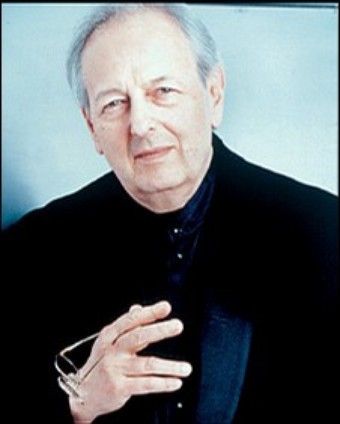Previn premiere serves up winningly retro Americana at Tanglewood

Andre Previn's "Music for Boston" received its world premiere Saturday at Tanglewood.
Andrė Previn’s Music for Boston, a colorful set of three orchestral movements that received its world premiere at Tanglewood Saturday night, was a throwback in more ways than one.
Sharing the Boston Symphony Orchestra bill with two well-known works, Elgar’s Cello Concerto and Shostakovich’s Symphony No. 5, Previn’s piece arrived with little advance publicity. That’s old-fashioned right there.
Previn worked in Hollywood during his salad days, and he knows how to create suspense. He wrapped his new piece in an opaque generic title, and before conductor Stéphane Denève stepped up to lead the orchestra on Saturday, the famously articulate composer, conductor, and TV host had barely breathed a word about it.
Then the music began, and with it a second throwback. Commissioned in honor of the Tanglewood Festival’s 75th anniversary, Music for Boston turned out to sound quite a bit like music from 75 years ago—specifically, the fervent, energetic, and very American symphonies of Roy Harris and William Schuman, works championed back then by this orchestra and its music director (and Tanglewood founder) Serge Koussevitzky.
All the hallmarks of that mid-century style were there: the lusty surge of strings, outbursts of brass, wide-open sonic spaces occupied by lonely wind solos, muscular fugues, stuttering jazz rhythms, tangy polytonal dissonances, and big yet clear orchestral sound. The piece lacked only the heroic fortissimo finish, ending instead on dwindling phrases over a soft pulse in the timpani.
Previn hasn’t said whether he intended to pay tribute to that earlier era, or arrived at that style independently through his own experience as an immigrant American musician steeped in the movies and jazz. He did, enigmatically, mark the first of the three movements “Tempo I”—normally an indication in music scores to resume a previous tempo. What was he “resuming” at the start of this piece?
Whatever the answer, the result was attractive music of considerable expressive range that will reward repeated hearings. Previn did let on to BSO program annotator Marc Mandel that he was composing for this orchestra as an ensemble, not a collection of star solo players, and Denève’s direction deployed the orchestra’s colors and effects accordingly. At the end of the performance, the 83-year-old composer rose at his seat to acknowledge the applause.
Following the Previn piece were two works where the mystery was built into the music, and passion was wrapped in a necessary reticence. In the Elgar concerto, it was the behavior code of an English gentleman that circumscribed the music’s expression of personal grief and memories of the horrors of World War I. Shostakovich, on the other hand, had to choose his notes carefully because he faced the very real possibility of imprisonment (or worse) if his new symphony was deemed by Stalin’s bureaucrats to be insufficiently supportive of socialist ideology.
Soloist Yo-Yo Ma hit just the right stance for the Elgar, playing with dignity and resolve while letting the music’s deep emotions show through. The hardest work of the night for him seemed to come not in the scintillating scherzo or the aching Adagio, but in making sure the brittle, biting finale stayed in character and never became a romp.
Through it all, Denève and the orchestra matched Ma nuance for nuance. In a questionable choice, soloist and conductor began the piece before the audience was fully settled, and the unaccompanied cello’s dramatic opening statement was partly lost in the hubbub.
An additional distraction, beyond the performers’ control, was some extra bass-drum notes supplied during Elgar’s Adagio by the fireworks show at the Zucchini Festival in nearby Stockbridge.
Shostakovich’s Fifth was tremendously effective when Denève led it in a BSO subscription concert last winter, but somewhat less so here. The persistent dotted and dactylic rhythms of the first movement had gone a little lax, blurring the tense, obsessive character of the softer passages. Denève did whip up an exhilarating accelerando at mid-movement, however. The disconsolate Largo also went out of focus in places, but benefited in others from superbly expressive wind solos.
In the never-ending debate over whether this symphony knuckles under to Stalinism or secretly satirizes it, Denève appeared to have firmly chosen the latter view. He pounded out the scherzo in a heavy three-to-a-bar, dancing a ballet in Red Army boots. Similarly, Denève missed no opportunity to emphasize the loutish thuds and dissonances that color the supposedly “triumphal” themes of the finale. His forceful interpretation wowed the audience, who applauded enthusiastically.
The BSO performs Copland, Barber and Beethoven under Bramwell Tovey at Tanglewood 8:30 Friday and Beethoven and Bartók under Rafael Frühbeck de Burgos 2:30 p.m. Sunday. tanglewood.org; 413-637-1600.